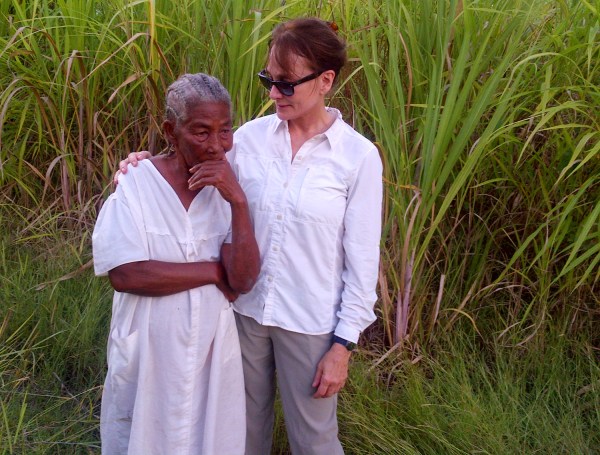 NBC News
NBC News
Dr. Nancy Snyderman of NBC News with Dieumene Bastien in Haiti.
Producer, NBC News
Survivors and family members of nearly 700,000 Haitians who have contracted cholera are suing the United Nations for billions of dollars, accusing the U.N. of covering up its role in starting the worst outbreak of the deadly disease in modern history.
“They have to help us because there are so many kids that are orphans now, that lost their mom, that lost their dads,” said plaintiff Felicia Paule, 45, who survived cholera but lost a daughter, brother and nephew to the disease. “They’re responsible, so they have to help.”
The suit will be filed in Manhattan federal court on Wednesday despite the U.N.’s longstanding immunity to all legal claims of wrongdoing.
The U.N. has cited its immunity, and has not accepted responsibility for the epidemic, even though medical experts – including members of an independent panel appointed by the U.N. — agree that the disease was probably introduced by U.N. peacekeepers. During an interview in Port-au-Prince Monday, a top U.N. official repeatedly refused to answer questions from NBC News’ Chief Medical Editor Dr. Nancy Snyderman about whether the U.N. was to blame.
“I can’t answer that question,” said Sophie de Caen, senior country director for the United Nations Development Programme. “It’s an ongoing legal case and it’s something that needs to be discussed with the U.N. legal office in New York.”
Watch Dr. Nancy Snyderman on ‘NBC Nightly News’ with more on the cholera epidemic
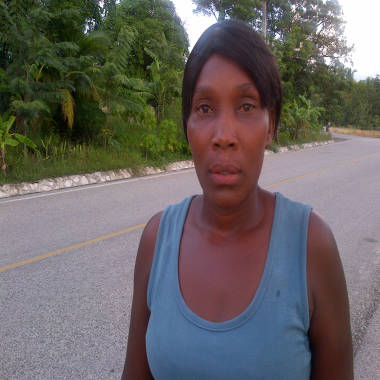 NBC News
NBC News
Lisette Paul, 41, said that the worst part of losing her 18-month old daughter Jumara to cholera was having to bury her in a hole. Her daughter got sick in the first outbreak of cholera in late 2010, and her brother and father also died. Lisette got the disease in 2012, but survived.
“I think what’s important is to see what we’ve been doing since the outbreak,” she added.
Since the cholera outbreak began near Mirebalais, Haiti in late 2010, just ten months after a devastating earthquake, more than 650,000 Haitians have contracted the disease, which had been unknown in the country for centuries. It has now spread to Venezuela, Cuba and the Dominican Republic, and has now killed more than 8,500 people.
Numerous scientific studies have linked the disease to a group of U.N. peacekeepers from Nepal who arrived at a camp near Mirebalais in October 2010. Tests show that the strain of cholera circulating in Haiti is genetically similar to cholera found in Nepal.
Members of an independent panel appointed by the U.N. initially said that the evidence pointing to the peacekeepers was not conclusive, but have since said that new evidence indicates the soldiers were the likely source.
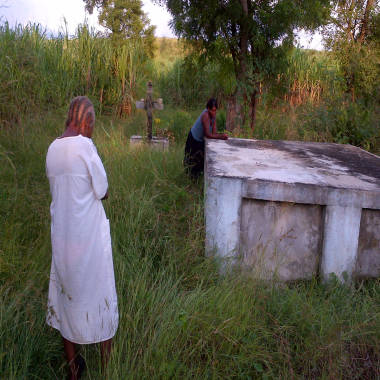 NBC News
NBC News
Lisette Paul (leaning on crypt) and her mother Dieumene Bastien say that some family members who died of cholera were put in plastic bags and buried in holes in the ground because people were afraid of contracting the disease during a proper burial. One cholera victim, Dieumene’s son – Lisette’s brother – is buried in the crypt.
The Institute for Justice and Democracy in Haiti, the advocacy group that will file the suit Wednesday, first tried to file a claim with the U.N. in 2011. The United Nations did not respond for more than 15 months, but then invoked a sweeping immunity from nearly all legal claims that dates back to its founding. Though the U.N. has committed hundreds of millions of dollars to fight the disease, it has not indicated a willingness to settle individual claims from victims.
“We felt it would be much easier to resolve this out of court, to spend less money on lawyers and litigation and more money on stopping cholera in Haiti,” said Brian Concannon of the IJDH. “The U.N. refused to take that opportunity and left us no choice but to go to court.”
The IJDH suit, however, goes beyond placing blame on the U.N., accusing the international body of covering up its role in introducing the disease.
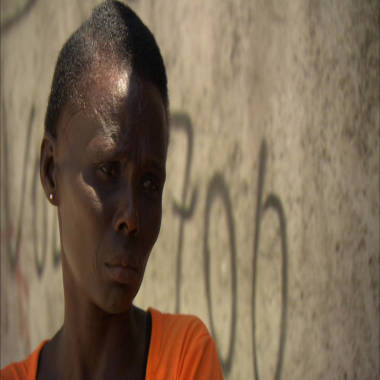 NBC News
NBC News
Felicia Paule, 45, lost a daughter, brother and nephew to cholera.
“Because no one was telling anyone the truth,” claimed Concannon, “there (were) a lot of people who were getting sick.”
A group of Nepalese peacekeepers were rotated into an existing camp a mile south of Mirebalais, Haiti, on a tributary of the Artibonite River in October 2010. The Artibonite is a major source of drinking water for Haitians. Within five days, a Haitian living downstream had died of cholera. Within a month, the disease had reached every corner of the country.
Plaintiff Lisette Paul of Mirebalais said that the disease spread quickly. “When the cholera first came we didn’t have access to hospitals so everyone passed it on to one another,” she recalled.
Her daughter, only 1 ½ years old, began vomiting , developed diarrhea and then died. “The worst part,” said Paul, “is after you have a child die like that, you can’t even give her a proper burial. You just dig a hole, because that’s all we could afford.”
Suspicion about the source of the disease soon centered on the peacekeepers. Cholera is endemic in Nepal, and there was an ongoing outbreak in the Himalayan country. Reporters who visited the peacekeepers’ camp noted a strong smell of sewage and saw exposed and leaking sewage pipes over a drainage canal and brown sludge in a drain leading into the river.
The plaintiffs, however, say it is a “question of law and fact” whether “defendants illegally sought to cover up their actions.”
The suit alleges that U.N. officials falsely claimed that peacekeepers had been tested for cholera and none had come back positive, and barred Haitian health officials from the camp in late October. The suit also alleges that the U.N. issued a false statement that its septic tanks were up to U.S. EPA standards, and that an official told a reporter that a pipe carrying sewage was carrying only kitchen waste.
“Defendants released false statements and misleading information about the evidence,” alleges the suit, “which placed anyone relying on their assertions at additional risk of contracting cholera.” Plaintiffs also claim in their complaint that “defendants … willfully delayed investigation into the outbreak and obscured the discovery of the outbreak’s source, resulting in additional harm.”
In its suit, the IJDH is asking for an unspecified amount for victims, and for the U.N. to make improvements to Haiti’s water and sanitation infrastructure that are projected to cost $2.4 billion.
The IJDH’s Concannon acknowledged that no one had ever successfully sued the U.N. in court, but said he was hopeful about the outcome. “In terms of actually winning a judgment in a court, there has never been a case against the U.N. where the liability is so clear and the damage is so great,” he said.
He also noted that some parties with grievances against the U.N. had received satisfaction despite the body’s legal immunity. In 1965, for example, UN peacekeepers in the Congo were accused of damaging properties and injuring people. They submitted claims to the UN, and the UN settled some of the claims.
“Many people, through a combination of political pressure and public pressure and showing the merits of the case, have received compensation from the U.N.,” he said. “The U.N., in fact, time and time again, acknowledges an obligation to pay for the injuries it causes. “
In a statement, a spokesperson for U.N. Secretary General Ban Ki-Moon, who is named as a defendant in the IJDH suit, told NBC News that it could not comment because “it is not the United Nations’ practice to discuss in public claims filed against the Organization.”
The spokesperson said the U.N. is working “on the ground” in Haiti to “do all that the Organization can do to help the people of Haiti overcome the cholera epidemic.” The U.N. has spent $118 million to date to respond to the outbreak, and plans to spend millions more, depending on the level of international contributions.
A representative of MINUSTAH, the U.N’s mission in Haiti, which is also named as a defendant, referred questions to the U.N.’s legal office in New York. Edmond Mulet, who headed MINUSTAH at the start of the outbreak and is also named as a defendant, did not respond to requests for comment.
More from NBC News Investigations:
_______________________________________________________
Previous posts from NBC News Investigations
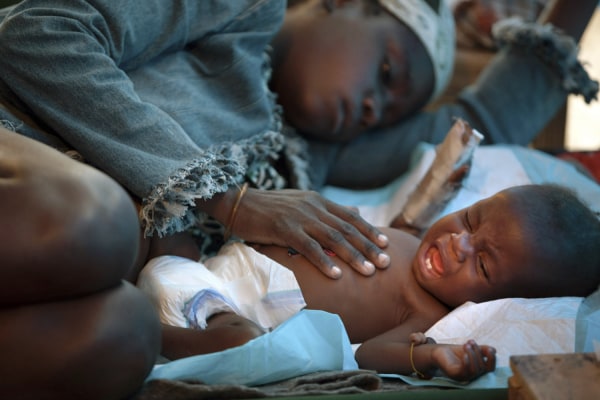 Allison Shelley / Reuters file
Allison Shelley / Reuters file
Velune Noel, 24, lies with her cholera infected 12-month-old son Peterson Sharmont, on a cot at a Samaritan’s Purse cholera treatment center in the Cite Soleil neighborhood of Port-au-Prince on Jan. 8, 2011.
Producer, NBC News
NEW YORK — Haitian protesters gathered outside U.N. headquarters Thursday to demand that the international body admit its role in the worst outbreak of cholera in modern history and provide compensation, but experts said the protesters may find it hard to hold the U.N. accountable.
“The victims have to be compensated for what they went through,” said Marjorie Gaston, a 49-year-old Haitian-American from New York, as representatives from 193 member states met inside during the U.N.’s annual General Assembly. “There is responsibility here, not just morally but financially.”
More than 650,000 Haitians have come down with cholera in the past three years, and more than 8,500 people have died in an epidemic that scientists have traced to leaking sewage at a camp established by Nepalese peacekeepers. A Boston-based human rights group called the Institute for Justice and Democracy in Haiti, which has already tried to file a claim against the U.N. once, is now preparing lawsuits against the U.N. in both Haiti and the U.S. demanding restitution for the victims.
But in response the U.N. has invoked a sweeping immunity from nearly all legal claims that dates back to its founding, and experts in international law say that this legal shield has proved almost impenetrable over the past seven decades.
In 1946, the year of its first General Assembly, the U.N. granted itself legal immunity as one of its first official acts. Member states signed a ratifying treaty, and that immunity has been endorsed separately by laws passed in many member states.
“You can’t sue the United Nations in a domestic court or any court because governments have signed the treaty and some countries like the U.S. have even put it in domestic legislation,” explained Larry Johnson, a former U.N. official who teaches international law at Columbia Law School. “People have tried in various jurisdictions but their cases have been thrown out because it’s against the treaty and in some cases against domestic law.”
According to Johnson, top U.N. officials have a full immunity from prosecution and litigation akin to that of any diplomat. Lower level U.N. representatives, like peacekeepers, have immunity for tasks performed as part of their jobs.
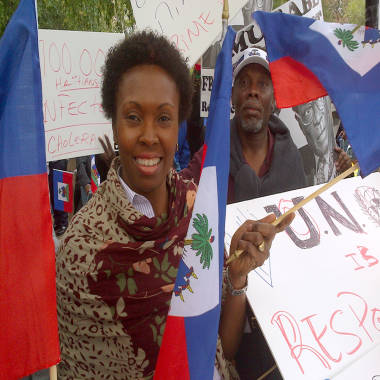 NBC News
NBC News
Marjorie Gaston protests outside the United Nations in New York on Sept. 26, 2013.
After the massacre of 8,000 Muslims by Serbian forces in Bosnia in 1995, a group of women called the Mothers of Srebenica tried to sue the U.N., alleging that Dutch UN peacekeepers didn’t do enough to prevent the killing. Both Dutch courts and the European Court of Human Rights rejected the suit, sustaining the U.N.’s immunity, even though the Dutch government was found liable in a separate case.
But according to Alex Whiting, a Harvard Law professor currently on leave to work as Prosecution Coordinator at the International Criminal Court in the Netherlands, immunity “does not mean the U.N. ignores all claims of wrongdoing.”
“What happens is there are typically alternative mechanisms for resolving disputes,” said Whiting. “If a U.N. member commits a tort, the U.N. will typically agree to some sort of settlement process to resolve it for the victim.”
In 1965, for example, U.N. peacekeepers in the Congo were accused of damaging properties and injuring people. They submitted claims to the U.N., and the U.N. settled some of the claims.
To date, the U.N. has not indicated a willingness to settle claims in Haiti, though most scientific studies have traced the cholera outbreak to U.N. actions.
After the Haitian earthquake of 2010, a new contingent of U.N. peacekeepers from Nepal came to live in an existing camp near a tributary of the Artibonite river. Within weeks, locals began developing cholera, a disease that hadn’t been seen inside the Caribbean country’s borders in the past two centuries. Three years later, new cases are still being reported, and the disease has spread to the Dominican Republic, Cuba and Venezuela.
Numerous scientific studies have determined that the strain of cholera circulating in Haiti is similar to cholera found in Nepal, and say evidence suggests it was introduced by the peacekeepers, who allowed the sewage from their camp to flow into the river.
“Our findings strongly suggest that contamination of the Artibonite and one of its tributaries downstream from a military camp triggered the epidemic,” said a report published in a journal edited by the Centers for Disease Control in 2011. “There was an exact correlation in time and places between the arrival of a Nepalese battalion from an area experiencing a cholera outbreak and the appearance of the first cases in Meille a few days after.”
The Haitian public blames the peacekeepers for the disease, and has protested against the continuing presence of both the peacekeepers and U.N. police, whose combined forces total more than 10,000. The Haitian legislature has asked the peacekeepers to leave.
The U.N., however, has refused to accept blame for the epidemic. A 2011 report commissioned by the U.N. confirmed that evidence pointed to the peacekeepers, but concluded that a “confluence of circumstances” had caused the outbreak. Secretary General Ban Ki-Moon said at the time that the results of the scientific studies were not definitive.
When the Institute for Justice and Democracy in Haiti filed a claim with the U.N. on behalf of 5,000 Haitian cholera victims in 2011, he invoked the U.N.’s time-honored legal immunity to explain why no money would be forthcoming.
Instead of paying claims to victims, the Secretary General announced a drive to raise hundreds of millions of dollars to fight cholera in Haiti.
In July, the members of the U.N.’s cholera panel — no longer working for the U.N. — updated their earlier assessment. They said that the accumulated evidence now pointed to the peacekeepers as the source of the cholera. The UN has not issued a formal response.
In August, responding to an editorial in the Washington Post that urged the U.N. to “right a wrong,” Moon’s spokesman said that the UN needed help to fight cholera, and asked for money.
“Since the onset of the epidemic, we have been on the ground every day responding to alerts of new cases, supporting medical care for victims, rehabilitating cholera-treatment centers, disinfecting health facilities, treating sewage, training health workers and providing much-needed medicines and vaccinations,” wrote Martin Nesirky. “This work goes with our longer-term efforts on improving water and sanitation infrastructure.”
Nesirky said that only half of the $444 million needed for the next two years had been raised. Wrote Nesirky, “The hurricane season is looming. Donors need to step up.” He did not address the editorial’s contention that peacekeepers had caused the outbreak.
Nesirky did not immediately respond to a request for comment on the U.N.’s current position on the origins of the epidemic.
Outside the U.N. on Thursday, a lawyer for the IJDH said the group still planned to press forward with its lawsuits despite the legal obstacles. “We know what the challenges to jurisdiction are,” said Brian Concannon, “but we’re confident that this case can overcome them.”
More from NBC News Investigations: